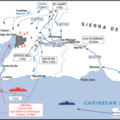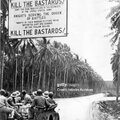This time we decided to again sail to foreign waters in our interview series and conducted an e-mail interview with American journalist Walter Pincus, who reports on intelligence, defense and foreign policy for The Washingon Post. We asked him about topics related to the American perception of recent armed conflicts and the conclusions they have driven from those. The Hungarian translation can be accessed here. We ask our readers to comment here in English and there in Hungarian.
[KatPol]: There’s a famous and often quoted line from Carl Clausewitz: „The first, the supreme, the most far-reaching act of judgment that the statesman and commander have to make is to establish … the kind of war on which they are embarking.” In this sense, how would you rate the ability of the US political leadership in the past 10 years? Were they successful in framing the conflict? How successful do you think they were in framing a strategy?
[W.P.]: I will focus on Iraq and Afghanistan, both undeclared wars under our Constitution. President Bush entered what has become the war in Afghanistan with the limited goals of capturing Osama bin Laden, destroying Al-Qaeda and punishing the Taliban rulers for allowing planning of 9/11 to take place in that country. It clearly grew into something more.
The invasion of Iraq and the fighting that followed represented a total misjudgement on Bush’s part both in terms of military strategy and domestic policy and the country has since been paying the penalty for that.
President Obama initially made the mistake of expanding the US role in Afghanistan to one of nation-building rather than the more modest goal he has now adopted of training government and local forces well enough to provide security against insurgents while negotiations are encouraged to find a political rather than military solution.
Obama’s goal of removing US combat troops from Iraq and trying to encourage various elements in Iraq to solve their governing problems themselves was a correct approach.
[KatPol]: You raise some interesting points which I want you to clarify for our readers. On the one hand there was an interesting change in the tone of the debate about the Afghanistan war and the role of counterinsurgency (COIN). After the surge of 2007-2008 in Iraq, COIN seemed to be the answer to every problem previously faced by US forces, and General David Petraeus was the face of this argument.
However, the political class seemed to forget that the Surge was a one-off - many different things converged beside the increase of troops to what amounted to be a tactical victory and an operational stalemate, precisely because there was no political solution introduced in Iraq to exploit the improved security situation. At this point I’d like to quote former Secretary of Defense Robert Gates, who said in one of his latest interviews to CNN as secretary: “… look, the reality is the United States had a very limited commitment in Afghanistan until well into 2008. And we did not have the right strategy and the right resources for this conflict and a lot of resources, those needed to do the job, until the late summer of 2010”.
So in your opinion was there a misconception in the Obama administration about what force (and especially population-centric COIN) can achieve and in what timeframe in Afghanistan? The other interesting point you raise is the negotiation underway with the Taliban. What do you think is a realistic goal, considering that the Afghan insurgency is highly decentralized and consists of many groups and significant regional interests are at work?
[W.P.]: COIN and the Surge in Iraq were different than those two elements in Afghanistan. We learned in Iraq that we could not force political settlement among the main elements and withdrew when the internal threat from al Qaeda lessened but did not end. COIN and the Surge in Afghanistan, like Iraq, is a temporary state and withdrawal has begun again while there is no overall political solution. Petraeus' COIN idea was not to provide full security throughout Afghanistan; just limit the threat that Taliban areas would become strong enough to allow al Qaeda to reopen its training camps now under UAV strikes in Pakistan.
The Taliban negotiations in the long run rest with them and the Afghans. We will be withdrawing by 2014 to Bagram and several other bases and leave settling Afghan problems to Afghans while we make sure al Qaeda doesn't return.
[KatPol]: Are you arguing for a modified version of what became known in the press (especially due to George Will’s article) as “off-shore balancing”? That certainly would mean some severe restriction on military options for the United States, wouldn’t it?
[W.P.]: I don't think you can make a generalization about US security policy nor safely predict what military options will be employed in the future. The US has never declared a single military policy, it has created different ones in reaction to the world situation or immediate crisis it faces. The newest strategy paper reflects lessons learned in Iraq and Afghanistan, tempered by the current fiscal situation. Will's "off-shore balancing" fit his view in 2009, but it may not be retained should something unexpected occur in 2013 that directly affects our national security and requires furnishing of ground troops for direct conflict rather than counterinsurgency operations.
[KatPol]: Has nation building become a dirty word in US politics?
[W.P.]: Nation-building has become a negative in U.S. politics, but in some parts of the country foreign aid or assistance, though much less costly, has always been a negative.
[KatPol]: It's a popular view nowadays that after the Vietnam War the US military leadership refused to view the lessons learned there as useful in the future and the armed forces basically went on to "pick" the conflicts they were willing to fight, conflicts where the concept of winning and losing was more clear-cut. There already are some voices concerned about a possible return of this attitude with regard to current conflicts (such as General Gordon Sullivan and Nick Dowling). In your opinion what is the attitude of the current Army institutions regarding the lessons of the past decade's irregular conflicts?
[W.P.]: I think the best answer is found in the new Obama national strategy paper and the budget that was presented in February. It reflects learning the lessons of the last decade – doubting there will be any major land wars or even major “stability operations” such as Iraq and Afghanistan. But learning that the future may be small actions better dealt with by special forces and areas where US intervention is best used by working with other nations and providing strikes from the air or sea.
[KatPol]: What are the innovations – technical or organizational – stemming from the wars in Iraq and Afghanistan that you consider to be of great importance for future conflicts in the next 10 years?
[W.P.]: They are obvious, beginning with drones from the air, robotics on the ground. Our so-called ISR (intelligence, surveillance and reconnaissance) has become key with its only limitation that it has not proved itself in an environment with hostile air defenses. But attention should be paid to the new emphasis on working within created alliances.
[KatPol]: Some might argue that what you’re describing is a new version of the (some would say) old ‘instead of men, send bullets’, just change the bullets to robots. What adverse effects might these changes have in your opinion? Don’t you think that this ‘robotization’ could have an adverse affect on the political leadership’s willingness to start conflicts?
[W.P.]: One constant of US policy is the hope to deter wars based on the threat of Washington's superior military assets. The forward basing of Navy, Marines and US aircraft is primarily for deterrence. If drones or robotics, at least the threat of them deters one party or another from initiating war, so much the better. That's what nuclear weapons are also for.
[KatPol]: An interesting aspect of the war in AfPak is the use of UAVs (or 'drones' as they are usually called). Their use to kill ‘targets’, who are usually members of al Qaeda Central or some regional militant group, has raised some serious questions about the legality of the process, but this debate haven’t really entered mainstream discourse, unlike the torture question or the fate of the prisoners at Guantánamo. Why do you think this effort is less debated than the others?
[W.P.]: The use of UAVs is less debated because of where it takes place – in Afghanistan and as part of an open war effort. Pakistan's Northwest Territory is recognized as a sanctuary for Taliban fighters and thus an extension of an accepted Afghan war. The limited other attacks appear to be on al Qaeda targets or others connected to known attacks on the U.S.
[KatPol]: During the debates of the GOP hopefuls the questions of national security often came in one sentence with covert action with regard to Iran, for example. Are we witnessing the reclaiming of the Eisenhower legacy, or is this a kind of projecting-strength-on-the-cheap view of the world for campaign purposes?
[W.P.]: As I’ve written several times, the GOP presidential candidates have said very little about national security and when some do, they use inaccurate information. Their avoidance of the issue indicates the public’s general satisfaction with the Obama national security policies, which is also reflected in polling.
[KatPol]: The current conflicts brought together the US Armed Forces and the Intelligence Community in a way unprecedented since the Vietnam War. In your opinion what legacy will this cooperation leave after the termination of the conflicts?
[W.P.]: I believe these types of conflicts require not only close cooperation but also the background of leadership of the DoD and Intelligence Community. Remember that Bob Gates was a Defense Secretary whose history was in the CIA including being its director. It isn’t by chance that Leon Panetta moved from the CIA to Defense with Gates’ support.
[KatPol]: During the so-called War on Terror the CIA, having suffered previous Congressional investigations such as after the Iran-Contra affair or the Church Committee’s investigation, developed a strategy to get the backing of the political leadership for every controversial program. In your opinion, will it be possible for the IC to continue the practices developed during the last few years?
[W.P.]: I believe the CIA has learned over the years that it needs proof that its actions are in direct response to Presidential orders that are both legal and clear. The last 10 years have shown that having long-term experience teaches intelligence chiefs to understand that undertaking controversial operations during one administration does not protect the agency from criticism from the next.
[KatPol]: You've written about the recent development of the US basically injecting itself into Sub-Saharan armed conflicts by providing military assistance to Uganda and Nigeria. In your opinion, do the strategic and security interests of the US warrant this policy? What considerations may have driven political decision-makers to embark on it? Do you see this endeavor as sustained - even escalating perhaps - in that region in the future?
[W.P.]: I’m concerned that the new emphasis on special forces may increase such interventions. The current special forces group sent by President Obama into Uganda, the DRC and the Central African Republic dealing with the LRA was pushed by members of Congress pressured by outside groups. The involvement in Sudan started with evangelical and congressional groups. Today some members of Congress are beginning to push assistance to Nigeria because of the links of insurgents to Al-Qaeda. US national interests require diplomatic efforts but military intervention holds the danger of deeper involvements.
[KatPol]: So you think such diplomatic efforts are basically lacking in Sub-Saharan Africa and maybe elsewhere as well? That the Obama administration is thinking too much in terms of military measures?
[W.P.]: I think diplomatic efforts are being tried but may not always work. But you will notice that more recent coverage and discussion of Nigeria has focused more on the dissident group being driven by domestic Nigerian issues and not by the al Qaeda relationship. That means to me that there is recognition that any US military involvement is neither wanted by the Nigerians nor thought necessary by the US. We are not and cannot be policeman to the world's individual problems.
[KatPol]: You've argued that both the naval and the nuclear arsenal of the US Armed Forces are, simply put, oversized. You've also mentioned, on the other hand, the recent trend of weapons programs getting cut and delayed - the JSF and FCS are well-known examples. The F-22 program was also plagued by delays and cost overruns, and eventual purchases were sharply cut as a result. Do you think that we will see in the near future not only similar cuts and delays but also the arsenals actually getting downsized? If yes, in your opinion will this be the result of further budgetary constraints or a re-evaluation of the nation's security strategy, or both?
[W.P.]: The new National Security Strategy and resultant budget reflect both slowing down of new weaponry and some cutting of numbers. Both budgetary pressures and the current view of the Obama national security team have led to this situation. Another factor is the lack of a real, major national security threat as existed in the Cold War. Terrorism, though a problem, is not one requiring major weapons. China is on the horizon but is far behind the US in armament. There’s a desire to reduce nuclear warheads and delivery systems but the US presidential campaigns, as well as ones in Russia and China will delay any arms control movement for a year or two.
[KatPol]: You had a very interesting article on President Obama seemingly following in the footsteps of the Bush Administration in the counterterrorism field. You mention that a recent strategy paper released by the administration is in effect reviving preemption as a viable concept (of course in a more limited fashion) and borrows ideas on ungoverned spaces. In a broader sense, how would you rate the evolution of President Obama’s counterterrorism policies compared to the previous administration?
[W.P.]: The Obama administration has modified some past practices but the country still remains on alert with overlapping counterterrorism operations carried out by different agencies.
[KatPol]: In your opinion, how will the wars in Iraq and Afghanistan influence the US political leadership in committing forces to unilateral (or multilateral) action in the future?
[W.P.]: That depends on the administration. Clearly Obama appears unwilling to engage unilaterally short of a proven major direct attack on the US homeland from some foreign entity or group.
[KatPol]: In your opinion, will we see this new policy implemented in Syria, Yemen and maybe Iran in one way or another and if yes, what likely results will it yield?
[W.P.]: I think the Obama administration is hesitant about the use of military force unilaterally as mentioned above. Military intervention in Syria, even the arming of dissident groups is difficult for the US since it is not clear who is in the opposition. Syria's neighbors, the countries of the region have to take the lead. As for Iran, it seems clear we do not think Iran has crossed our red line and are working to persuade the Israelis that for them to act would be wrong. Part of these decisions rests on no one knowing what the reaction to any attack would be. And right now it appears to be a waiting proposition. As for Yemen, it appears the US is working with the post-Saleh regime with our focus on the al Qaeda element, leaving Yemenis to solve their own governmental issues.
[KatPol]: Some commentators recently stated that the example of letting president Saleh of Yemen enter the US is a sure sign that the Obama administration is viewing the Middle East too much in counterterrorism terms and not enough in the context of the regional interests of the US. Do you think this is a fair criticism at the time of the Arab Spring or is the criticism unjustified?
[W.P.]: I think you need to know the full details of Saleh's situation. Remember, the deal to have him step down included that neither he nor his immediate family would be prosecuted, so why should he be denied entry for medical reason to the US?
[KatPol]: The main point of this argument is that, like the reception of the Shah of Iran after the Iranian Revolution, this and moves like it connected to the unpopular dictatorships in the Middle East are really not benefiting the standing of the United States in the region. I gather you aren’t sharing this opinion, are you?
[W.P.]: The U.S. harboring a deposed, disliked leader for whatever the health reason will not prevent anti-Americanism which may be there not matter what.
[KatPol]: Last but not least: How likely is a possible strike against Iran in your opinion?
[W.P.]: I cannot guess whether or not there will be a strike against Iran. I doubt even the Israelis have decided what to do other than see how both sanctions and new discussions work out.







Utolsó kommentek